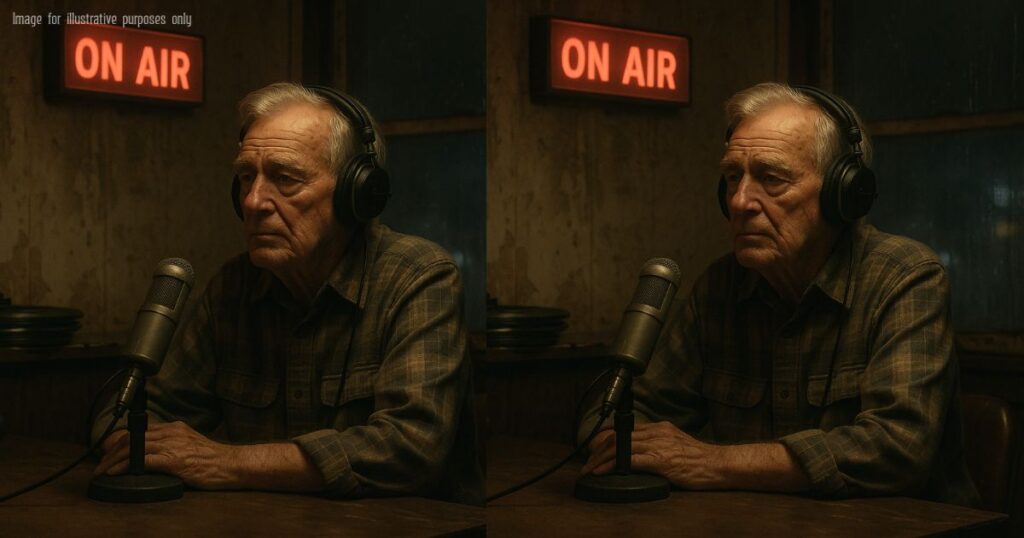The idea was simple, bold, and completely out of Hank’s league.
“You ever heard of podcasting?” Liam asked, pulling out a phone. “Or livestreaming?”
Hank looked at the device like it might bite him.
“You’ve got a voice, Mr. Grayson,” Liam continued. “A real one. People don’t just want noise anymore. They want real. And you? You’re the last of that kind.”
Hank chuckled, dry as kindling. “Son, I’m seventy-two. I don’t stream. I don’t cast pods. I barely understand voicemail.”
Liam grinned. “That’s where we come in. You talk, we’ll handle the rest.”
They called it The Midnight Broadcast. Ed offered to drive the hour to the old station every Friday night. Liam brought a secondhand laptop, a microphone, and enough tech know-how to rewire the dusty studio for online streaming. The three of them worked late into the week, eating gas station sandwiches under flickering fluorescent lights, cleaning decades of dust off Hank’s old chair.
By the following Friday, they were ready.
It wasn’t a grand launch. Just Hank, sitting behind the mic like he never left. No advertisers, no filters. Just a man, a story, and a song.
“Evenin’,” he said, voice a little hoarse, heart pounding. “This is Hank Grayson. And tonight, I want to talk about silence.”
He spoke of empty towns, shuttered factories, letters left unopened on kitchen tables. He told a story about a boy in 1972 who called the station because his dog had gone missing. Hank had aired the call, and the dog turned up two towns over. That boy was forty now, probably had kids of his own.
Then he played a scratchy version of “Hello in There” by John Prine.
Within ten minutes, the comments started rolling in.
“My dad used to listen to you on the tractor.”
“Crying in my kitchen right now, Hank.”
“Play that Carter Family song again—please.”
Something cracked open. Not just in the airwaves, but in people.
The second week, Hank talked about Clara.
How they met at a soda fountain in ’74, how she used to leave notes in his lunchbox when he worked at the plant. How she danced barefoot in the kitchen when the radio played Patsy Cline. He almost didn’t make it through that part. His voice broke once, twice.
But he kept going.
“I lost her to cancer. Twenty-two years ago. But she still hums in this place, y’know? In the walls. In the silence. Sometimes I think I hear her laugh when the coffee pot hisses.”
After that episode, a woman from Kansas sent in a painting—an old Zenith radio glowing on a windowsill. Beneath it, in brushy cursive: “Some echoes never fade.”
By month three, The Midnight Broadcast had 12,000 subscribers.
Hank didn’t understand how. He didn’t want to. All he knew was that the world felt warmer again. Every Friday, people tuned in from hospital rooms, truck cabs, assisted living centers. Veterans. Waitresses. Divorced dads. Young tech guys in San Francisco who missed their grandpa’s stories.
They wrote in with requests: talk about the ‘70s, the gas crisis, Hank Aaron. Talk about loss. Talk about hope.
One night, Hank read a letter from a teenager in Chicago. She said her dad was a vet, hadn’t spoken to anyone in three years. But after hearing Hank’s first broadcast, he started talking again. Said Hank reminded him of someone from back when the world made sense.
Hank choked on his coffee. “The world never made sense,” he said softly into the mic. “But we had people who did.”
On the anniversary of Clara’s death, he played their song—“Unchained Melody.” The booth was dark, except for the glow of the console. As the Righteous Brothers filled the silence, Hank leaned back, eyes closed.
“You hear that, darlin’?” he whispered. “They still play our song.”
He never heard the comments that poured in.
“Crying in Texas tonight, Hank.”
“Wish I had someone like that.”
“You’re not alone, old man. We’re all listening.”
That winter, Hank got a package.
No return address.
Inside was a small, brass plaque, polished and wrapped in newspaper. It read:
“In honor of Hank Grayson – The Voice of the People.”
Below it, a note, typed on a typewriter:
“Every tower needs a keeper. Every voice needs a home. Keep talking.”
Hank didn’t cry. He just smiled, stepped outside, and nailed the plaque to the base of the tower, right beneath the rusted ladder.
He’d never wanted fame. Never cared for followers or likes. But something was happening. Something real.
He wasn’t just talking anymore.
He was remembering.
Reminding.
Rebuilding.
One voice, echoing into the night—not for the past, but for the people still holding on.
Still believing.


